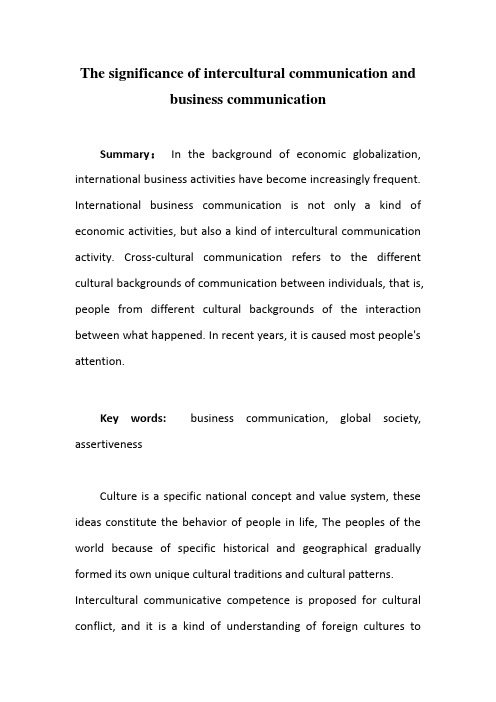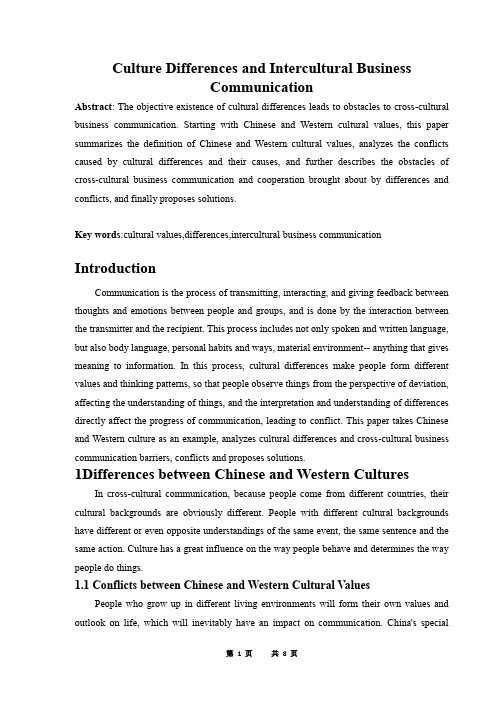跨文化商务交际 论文
跨文化交际与商务沟通在现实中的意义

The significance of intercultural communication andbusiness communicationSummary:In the background of economic globalization, international business activities have become increasingly frequent. International business communication is not only a kind of economic activities, but also a kind of intercultural communication activity. Cross-cultural communication refers to the different cultural backgrounds of communication between individuals, that is, people from different cultural backgrounds of the interaction between what happened. In recent years, it is caused most people's attention.Key words: business communication, global society, assertivenessCulture is a specific national concept and value system, these ideas constitute the behavior of people in life, The peoples of the world because of specific historical and geographical gradually formed its own unique cultural traditions and cultural patterns. Intercultural communicative competence is proposed for cultural conflict, and it is a kind of understanding of foreign cultures tomaster the basic knowledge and communication skills, the ability to cross-cultural communication flexibility in practical problems arise.Intercultural communication is becoming increasingly important due to the rise of globalisation and increasingly multicultural work environments. Because of this, the cultural intelligence and cross-cultural communication skills that come with studying in a foreign country are highly sought after by employers who seek to gain a competitive edge and break into in foreign markets. So, we should understanding culture differences in our world today is vital to advancement in all aspects of living----economic, medical, educational, military, religious, legal, government, and political. It is especially important in the business world because of the ways in which business connections are so global[1].So these programmes in order to offers you an opportunity to raise your cross-cultural awareness and enhance your intercultural communicative competence in international business settings, to reflect on your own culture and language use, and to develop the professional and business communication skills necessary to advance your career in the international business world.Intercultural communication is a form of communication that aims to share information across different cultures and socialgroups. It is used to describe the wide range of communication processes and problems that naturally appear within an organization or social context made up of individuals from different religious, social, ethnic, and educational backgrounds. Intercultural communication is sometimes used synonymously with cross-cultural communication. In this sense it seeks to understand how people from different countries and cultures act, communicate and perceive the world around them. Many people in intercultural business communication argue that culture determines how individuals encode messages, what medium they choose for transmitting them, and the way messages are interpreted.[2] In business fields,culture becomes into the lever and lubricant influencing those business activities. Thus,cultivating talents with intercultural communication competence is the final purpose of business English teaching. This paper has analyzed the reasons for the lacking of cultivating of intercultural communication competence in business English teaching by using the theories like the relationship between culture and language and communication competence,and then it suggested some ways to cultivate such kind of competence. In these ways,it is hoped that will cultivate more talents with excellent quality of intercultural communication competence and suitable for this age of economic globalization.Under the current situation of increasingly frequent international communication, the final aim of business English teaching is to cultivate inter-disciplinary talent who not only master business professional knowledge but also have cross-cultural communication competence.Assertiveness is the quality of being self-assured and confident without being aggressive. In the field of psychology and psychotherapy, it is a learnable skill and mode of communication. Dorland's Medical Dictionary defines assertiveness as: a form of behavior characterized by a confident declaration or affirmation of a statement without need of proof; this affirms the person's rights or point of view without either aggressively threatening the rights of another (assuming a position of dominance) or submissively permitting another to ignore or deny one's rights or point of view.[3] Think of specific situations when the communication went terribly wrong. Think now about the impact you had on it. You cannot change others, but by being assertive, you can improve the situation! For example, if you feel that your parents didn’t allow you to build strong self-esteem, this you cannot change. What you can change, however, is to take responsibility for your actions now and in the future in order to overcome your insecurity. In short, transform paralysing thoughts in actions.Remember, individuals arecapable of drawing nourishment from cultural differences and similarities. Becoming more sensitive to differences and acquiring the communication skills of your second culture will allow you to become more independent and capable of using the right skills to express yourself.In conclusion, becoming assertive will allow you to be more expressive, humorous, creative and capable of putting meaning into situations and to apply the right communication skills in the most diverse environments.This is a learning experience that you can incorporate slowly into your identity, allowing you to build bridges instead of burning them.The same is applicable to difficult situations with people from your own cultural background who have different personalities.[1].The Influence of Culture in The World of Business P46[2] Lauring, Jakob (2011). "Intercultural Organizational Communication: The Social Organizing of Interaction in International Encounters". Journal of Business and Communication 48.3: 231–55.[3]"assertiveness" in Dorland's Medical Dictionary。
浅谈跨文化商务交际论文范文

随着国家间的交往日益密切,跨文化交际是当今的一大趋势。
下面是带来的关于跨文化交际论文的内容,欢迎阅读参考!跨文化交际论文篇1:《跨文化交际中的非语言交际》摘要:非语言交际在人类交际过程中扮演着重要的角色,也因此受到人们的广泛关注。
本文重点介绍了非语言交际的定义和分类,并以体态语为例探讨了非语言交际在跨文化交际中的表现。
关键词:跨文化交际;非语言交际;体态语一、非语言交际的定义关于非语言交际,西方学者提出的定义很多。
有的定义很简单,如“非语言交际是不用言词的交际”。
Maandroeta,1989:5有的定义则比较具体,如“非语言交际是不用言词表达的、为社会所共知的人的属性或行动,这些属性和行动由发出者有目的地发出或被看成是有目的地发出,由接受者有意识地接受并有可能进行反馈”BurgoonandSaine,1978,见Maandro,1989:7。
或“非语言交际指的是在一定交际环境中语言因素以外的,对输出者或接收者含有信息价值的那些因素。
这些因素既可以人为地生成,也可以环境造就”Samovareta,1981:56。
①MaandroSamovareta,1981:156和Barer1989:5提出,“非语言交际是一种体现非语言行为的过程,它在特定的场合或语境中要么独自出现,要么与语言行为同时发生,以表达自己的思想或理会别人的意图。
”②二、非语言交际的分类非语言交际是一门跨学科的学术研究,涵盖范围极广。
非语言交际首先就是非主题的领域。
从跨文化交际出发,借鉴西方学者比较统一的认识,可以将非语言交际粗略地分为四大类进行学习:体态语、近体学、副语言、时间学。
一体态语体态语是传递交际信息的表情和动作,也被称作肢体语言。
的《体态语》被人们称为非语言交际领域行为科学家所做研究的总结。
他认为:体态语是用以同外界交流感情的全身或部分身体的反射性或非反射性动作。
二近体学,1966在研究人际交往中体距的变化时创造了一个新词e,cane”这使得这位美国友人十分纳闷,并感到不知所措,因为他不知这位学者到底是来还是不来。
商务英语与跨文化交际论文

商务英语与跨文化交际论文商务英语与跨文化交际论文商务英语与跨文化交际论文怎么写,下面推荐商务英语与跨文化交际论文相关范文,可供浏览参考。
商务英语与跨文化交际论文【1】摘要:跨文化交际是泛指一切在语言文化背景中有差异的人们之间进行的交际。
作为英语的专门用途——商务英语,在经济日益全球化的今天,成为现代国际商务活动中最重要的交流工具,成为人们工作学习中不可缺少的技能。
商务英语所包含的内容涵盖了商务活动的全过程,也涵盖了市场调查、谈判、签约、定购、支付、装运等一系列基本国际商务环节,作为一门沟通工具,商务英语就贯穿在这些商务活动及商务环节中,是商务活动成功的关键所在。
本文根据商务英语的特点,从跨文化交际角度,对如何培养学生的跨文化交际能力加以讨论,并提出了自己的看法。
关键词:商务英语;跨文化交际;培养一、引言文化是语言的重要属性之一,没有文化的语言是无生命的“死语言”,在人类社会的发展过程中必将消失。
随着社会的不断发展,经济的全球化,英语这门世界性的语言更是逐渐渗透到商务领域,商务英语逐渐成为大家争相学习的热点。
商务英语课程不只是简单地对学习者的英文学习水平、能力的提高,它更多地是传授如何和外国人打交道、如何和外国人合作、工作的方式方法、以及他们的生活习惯等。
从某种程度上说是包含在文化概念里的。
学习者在学习商务英语时,社会文化能力中最薄弱的环节在于语言本身所涉及的文化因素上,尤其是词汇的文化内涵,文化意识的培养对学习者的英语学习有事半功倍的效果。
在对外贸易、国际金融、海外投资、技术引进、招商引资、对外劳务承包与合同等国际商务活动领域,所使用的英语统称为商务英语(Business English),内容涉及到商务活动的方方面面,它是以适应商务领域中的职场生活的语言要求为目的,商务英语作为国际化交往中最重要的交流工具,已经成为人们学习和工作中不可缺少的技能。
商务英语教学的目标,不仅是交给学生“死”的单词、语法、句式等。
跨文化交际视角下的中西商务礼仪差异研究毕业论文答辩模板

跨文化交际视角下的中西商务礼仪差异研究毕业论文答辩模板一、概览本次毕业论文旨在探讨跨文化交际视角下的中西商务礼仪差异。
随着全球化进程的加速,商务活动中的跨文化交流日益频繁,了解不同文化背景下的商务礼仪对于促进国际交流与合作具有重要意义。
本研究旨在通过对比分析中西商务礼仪的差异,揭示其背后的文化根源,进而为减少误解和冲突、促进有效沟通提供理论支持和实践指导。
论文首先介绍了研究背景、目的、意义及研究方法。
在全球化背景下,商务礼仪已经成为企业展示自身形象、开展国际交流与合作的重要窗口。
中西文化差异导致商务礼仪存在显著差异,而这种差异对于跨国企业来说既是挑战也是机遇。
本研究通过对中西商务礼仪的深入研究,有助于拓宽人们对不同文化的认识和理解,增强跨文化交际能力,提升企业竞争力。
同时本文采用了文献研究法、比较分析法以及实证研究法等多种研究方法,确保研究的科学性和实用性。
论文的核心内容主要包括以下几个方面:首先,阐述中西商务礼仪的基本概念和特点;其次,对比分析中西商务礼仪在交际方式、言谈举止、宴会礼仪等方面的差异;再次,深入挖掘这些差异背后的文化价值观及心理因素;结合实际情况,提出在跨文化商务交流中如何有效运用礼仪知识,减少误解和冲突的策略和方法。
本次毕业论文的主要创新点在于:结合跨文化交际理论,深入分析中西商务礼仪差异;通过对实际案例的剖析,提出具有针对性的策略和建议;研究内容既具有理论价值,又具备实践指导意义。
同时论文也存在一定的不足之处,如研究范围的局限性、数据样本的代表性等,需要在后续研究中加以完善和改进。
本论文通过系统研究跨文化交际视角下的中西商务礼仪差异,旨在为企业和个人的国际交流与合作提供理论支持和实践指导,促进国际交流与合作的发展。
接下来将详细阐述论文的研究背景、理论基础、研究方法及核心论点等。
1. 研究背景及意义随着全球化进程的加速,国际商务交往日益频繁。
中西方的商务交流与合作不断深化,不同文化背景下的商务礼仪差异逐渐凸显出其重要性。
在商务英语教学中突出跨文化交际能力培养[论文]
![在商务英语教学中突出跨文化交际能力培养[论文]](https://img.taocdn.com/s3/m/81a91249336c1eb91a375de3.png)
在商务英语教学中突出跨文化交际能力的培养摘要:商务英语专业主要是为培养国际复合型人才,如何将跨文化交际能力的培养落到实处,满足社会对商务英语复合型人才的需求,是我们要重点解决的问题。
文章主要从跨文化交际能力的重要性及其和商务英语教学的关系出发,提出几点建议,以期促进商务英语专业学生跨文化交际能力的培养。
关键词:跨文化交际能力商务英语教学培养方法一、引言由高等教育出版社出版的高等学校商务英语专业本科教学要求(试行)指出商务英语专业旨在培养具有扎实的英语基本功、宽阔的国际视野、专门的国际商务知识与技能,掌握经济学、管理学和法学等相关学科的基本知识和理论,具备较强的跨文化交际能力与较高的人文素养,能在国际环境中熟练使用英语的复合应用型商务英语专业人才。
我认为要提高我国商务英语人才的能力,需要在注重语言技能和专业知识培养的同时,强调跨文化交际能力的培养,这与经济全球化和文化多元化对人才需求的提高是密切相关的。
可见,跨文化交际能力已经成为商务英语教学的重要任务之一,但是目前跨文化交际能力的培养并没有在教学活动中很好地体现出来,导致商务英语专业的毕业生在现实商务交际活动中缺乏跨文化敏感性。
本文首先介绍了跨文化交际及其与商务英语教学的关系,然后提出了几点建议。
二、跨文化交际能力与商务英语教学对于跨文化交际者而言,交际言语适切性的能力尤其重要。
半个多世纪以来,从跨文化交际(lado,1957)这一名词的出现,到“跨文化交际能力”(hall,1959)的提出,人们逐渐开始关注跨文化交际能力问题。
诸多学者将跨文化交际能力等同于跨文化能力。
byram (1997)提出跨文化能力,他认为跨文化能力指人们在国际交往中对文化差异的敏感性,对异族文化的了解程度,以及在跨文化交流中求大同存小异的能力问题。
这一观点认为跨文化能力是辩证看待文化差异的一种能力,在文化多元化背景下对自我文化认知的同时对多样性的他文化进行欣赏和分析,最终能让跨文化者在全球化背景下具有多重视角和换位思考的能力。
浅谈国际商务谈判中跨文化交际困境及应对措施论文

浅谈国际商务谈判中跨文化交际困境及应对措施论文0引言自进入 21 世纪以来,我国顺利加入国际世界贸易组织(简称WTO),作为组织的其中一员,使得我国与其他国家贸易交往的次数更加频繁。
在这一过程中,国际商务谈判的成功或失败尤其的重要,因为它对于一个国家的社会经济发展占有举足轻重的地位。
国际商务谈判跟国内商务谈判非常相似,是由国内商务谈判这一具体活动演变而来的。
不同的是,国际商务谈判所要求谈判人员的能力更加的高。
国际商务谈判中涉及到跨文化交际方面,这一方面需要谈判者熟练掌握贸易知识和与人交际沟通能力之外,更重要的是要了解和掌握不同国家的社会背景、文化背景以及尊重不同国家的价值观,做到知己知彼,最终才能跨越文化沟通障碍,取得最终的胜利。
本文将通过研究国际商务谈判中跨文化交际存在的一系列障碍,总结出一些对策,提高谈判中成功率。
1国际商务谈判中跨文化交际存在的障碍国际商务谈判中跨文化交际存在的障碍多种多样,接下来,会从三方面介绍。
1.1 不同的交流模式会造成跨文化交际的障碍在国际商务谈判中,商务谈判分为语言交际模式和非语言交际模式这两种基本的交流模式。
由于各国所处的文化背景和风俗习惯的不同,以至于中国和一些英语国家的交流方式在语言交际模式和非语言交际模式都存在着许多交际障碍。
据了解,著名的美国人类学家Hall的语境划分,中国属于高语境文化,而英语国家都属于低语境文化。
处于高语境文化的谈判人员,他们出于面子等一些因素的影响,往往用委婉并间接的方式去拒绝对方的观点。
而处于低语境文化的谈判人员,他们往往采取直接的方式去表达他们的想法,遇到对自己有利的条件时,他们往往是据理力争的,他们的态度诚恳并伴有坚定地语气。
除了语言交际模式之外,非语言交际模式在国际商务谈判中也存在差异。
拉尔夫·瓦尔多·爱默生曾经说过:"人的眼睛和舌头说的话一样多,不用字典,却能从眼睛你的语言中了解一切。
"所以说,非语言交际模式在商务谈判中也占据着重要的位置。
跨文化商务交际的意义

跨文化商务交际的意义在当今全球化的经济背景下,跨文化商务交际变得越来越重要。
随着国际贸易和跨国投资的不断增长,不同国家、不同文化背景的商业伙伴需要有效沟通和相互了解,以建立良好的商业关系和取得成功的交易。
本文将探讨跨文化商务交际的意义,并提供一些建议和方法来提高跨文化交流的效果。
首先,跨文化商务交际对于建立信任和良好的商业关系至关重要。
不同的文化有不同的商业习俗和礼仪,如果我们没有对目标文化进行足够的了解和尊重,可能会因为无意中冒犯对方而损害了商业关系。
通过了解对方的价值观、信仰和行为准则,我们可以避免误解和误判,建立起相互信任和尊重的基础。
其次,跨文化商务交际有助于打破语言障碍。
语言是文化的一部分,不同的语言反映了不同文化的思维方式和价值观念。
如果我们在跨文化交流中遇到语言障碍,可能会导致误解和沟通失败。
为了有效地开展跨文化商务交际,我们需要致力于学习对方的语言,或者至少学习一些基本的常用词汇和表达方式。
这不仅可以帮助我们更好地理解对方的意思,还可以表达我们的尊重和关注。
第三,跨文化商务交际有助于创造多元化的商业环境。
随着全球化的推进,越来越多的企业将目光投向国际市场。
跨文化商务交际不仅可以提供对其他文化的了解,还可以促进不同文化之间的交流和合作。
通过与来自不同文化背景的人合作,我们可以从他们那里学习新的观点和方法,拓宽我们的思维方式,从而为企业创造更多的商机和竞争优势。
此外,跨文化商务交际还有助于跨越地理边界,扩大商务网络。
通过与其他国家的商业伙伴建立和维护良好的关系,我们可以拓宽我们的商务网络,获得更多的商业机会。
当我们能够与不同文化背景的企业家和商业专业人士建立起互信和合作的关系时,我们可以互相分享经验,共同应对挑战,并共同实现商业目标。
总结起来,跨文化商务交际在当今全球化的商业环境中发挥着重要的作用。
通过跨文化交流,我们可以建立信任和尊重,打破语言障碍,创造多元化的商业环境,并跨越地理边界,扩大我们的商务网络。
浅谈跨文化交际中的商务礼仪差异

文化建设·5·一、引言目前全球化趋势已日益明显,各个国家之间的合作也越来越频繁,从而导致存在的问题也越来越多。
由于各个国家之间的历史文化不同,所追随的信仰也不同,因而存在许多差异。
而在商务谈判中,了解这些差异方可游刃有余地进行沟通合作,也更能体现出我们中国人的礼节所在。
接下来,本文将从三个方面来具体分析以下中西方在商务礼仪上所存在的差异。
二、差异的具体体现(一)称呼形式一方面,中国人有很强的宗族意识,强调“上下有区别,高贵与卑鄙有分,长老有序”“贬低自己和尊重他人”对自己来说是“鄙人”“拙见”“寒舍”等,对别人来说就是:“贵”“您”“张经理”等。
在西方,地址规则简单明了:“您”是您,“我”是我,很少使用标题来称呼他人。
即使有也仅限于王室、上层政府、军事界或法制界。
普通的陌生人可以使用先生、夫人和小姐,而熟人则使用他们的名字。
这是亲密关系和熟悉度的标志。
甚至父母和孩子也可以直接称呼他们的名字。
另一方面,以儒学为主导的中国是一个尊重老人的国家。
中国人认为老人是智慧的象征。
我们国家有很多体现这一价值观念的成语,譬如“宝刀未老、老当益壮、姜还是老的辣”等。
对于老人,请加上“老”一词。
头衔之前或姓氏后面要表示敬意。
西方人总是展望未来,期待一切。
“老”一词意味着软弱无用,这将阻碍社会进步。
称别人“老”是不礼貌的表达。
因此,在与老年人交谈时,我们应尽量避免提及或使用委婉语,例如用年长者代替老年人。
(二)餐桌礼仪宴请是一种联络感情、增进友谊的方式,东西方的商务人士都乐于此道。
但是,中国人与西方人在宴请上却存在很大的差异。
首先,饮食习惯的差异。
我们中华文化拥有五千多年的农耕历史,所以我们的食物多以五谷杂粮为主,运用修长的筷子来作为我们进食的工具。
大家多喜围坐一桌,共享美食,从而渐渐形成了共餐制。
但是西方国家与我们农耕业繁荣恰恰相反,他们多为发达的畜牧业,从而多以肉食为主,他们所使用的进食工具则是用来切割的刀叉,而且他们多喜一人一份,从而形成了分食制。
有关跨文化交际方向论文

有关跨文化交际方向论文摘要:跨国公司的建立、世界经济的不断融合,都为跨文化交际提供了可能。
未来世界将更加开放,各国人民之间的交流也将更加频繁。
关键词:国际贸易;跨文化交际;新趋势引言世界经济一体化的发展,其中最为重要的表现就是跨国公司的建立、国际贸易不断发展,使得各国人民因为交易的原因不得不频繁来往。
但是来自不同国家和地区的人,往往由于不同文化背景的熏陶影响,使得交流起来难免因为各种原因而困难重重。
在国际贸易中,各项活动都涉及各国人民之间的交流问题,而由于文化背景不同导致的交流问题可能会严重影响到国际贸易的发展。
为了解决各国人民因为文化背景不同而导致的交流障碍,跨文化交际的研究变得越发必要。
跨文化交际的发展在国际贸易背景下,不同文化背景下的人们之间的商务活动交流日益频繁。
跨文化交际的实际内容就是来自不同国家,受不同文化熏陶的人之间的交流合作的活动。
在国际贸易交流中往往会因为语言差异而导致谈判失败。
非语言交际是指除了语言之外的方式表达或传递的信息,如情感、肢体动作等。
因为来自不同国家的人,从小受到不同的文化背景和信仰的影响,情感表达方式之间也有着很大的差异。
跨文化交际对国际贸易的影响1.跨文化交际对开拓国际市场的影响因为跨国公司将分支公司设立在国外,这就需要在不同的国家开拓市场。
对不同国家的不同国情,开拓市场的要求也不同。
这时跨文化交际的研究便派上了用场。
只有充分了解不同国家的国情、国民生活习惯和需求,才能有针对性的对每个国家的市场进行调查,有利于跨国公司市场的开拓。
相反,如果因为国情的不同,盲目按照本国国情进行市场开拓,往往会造成公司亏损的情况。
例如,一家女装生产企业想要在阿拉伯建立分公司,该企业不仅需要在服装设计上下工夫,设计出样式新颖、适合大部分女性接受的样式之外,还要考虑阿拉伯地区女性的地位较低,在阿拉伯地区女性穿衣打扮不能太过暴露。
如果在该地区销售比基尼等暴露的女装,那结果可想而知。
由此可见,跨文化交际在国际贸易市场开拓方面的影响。
【2018最新】浅析跨文化交际中的商务礼仪差异,毕业论文-精选word文档 (20页)

本文部分内容来自网络整理,本司不为其真实性负责,如有异议或侵权请及时联系,本司将立即删除!== 本文为word格式,下载后可方便编辑和修改! == 浅析跨文化交际中的商务礼仪差异,毕业论文篇一:国际商务礼仪中的文化差异分析国际商务礼仪中的文化差异分析金融0902 严薇 0120915940826摘要:随着经济全球化进程的加速,国与国之间、公司与公司之间的跨国、跨文化的商务活动越来越频繁,不同地区、不同国家的文化往往存在差异,影响着人们的思维方式、价值观念,增加了国际商务交际活动的复杂性。
我国已经加入了WTO,国际贸易和对外交往日益频繁,国内企业要走出去,跨文化交际不可避免。
对于从事国际商务活动的人员来说,熟悉不同国家的礼仪,了解和掌握多元文化背景下的跨文化交际的知识和技巧,减少或消除因文化差异而引起的误会、摩擦和冲突,对有效地从事国际商务活动、提高交际效果具有十分重要的现实意义。
关键词:商务礼仪、中西方、文化差异商务礼仪是长期以来人们在商务活动中形成的一种行为准则。
不同国家由于不同文化背景、价值观以及民族主义等的差异,商务礼仪也是既有其国家性,又有其民族性。
以儒家、道家思想为核心的中国和以基督教为核心的西方在文化上存在的巨大差异,就必然导致中西方商务礼仪千差万别。
一、中西方礼仪差异分析中国传统文化是以血统纽带维系的宗法社会结构,表现为“天人合一”,重人伦轻自然、重群体而轻个体、重义轻利、重道轻器的特点。
重人伦轻自然,追求社会与人、人与人之间关系的“和谐”。
重群体而轻个体,强调人际关系、人情味,表达的是群体性、群体意识,注重人情世故,爱好面子,养成谦虚、谨慎、忍让、含蓄的传统性格。
“重义轻利”更是儒家思想的主流意识形态,主张的是“见利思义”、“以义制利”,提倡义利发生矛盾时,应当舍生取义。
由于受传统的义利思想的影响,重义轻利,重情轻法。
情、理、法,次序鲜明,任何事情,先看情、再讲理,法被排在最后,因此人们的法律意识比较淡薄,风险意识和竞争精神不强,时间观念和进取意识淡漠。
商务跨文化交际.doc

课题:商务场合中的跨文化交际前言:现今中国已经融入世界经济全球化的大潮。
随着外商在华投资与日俱增和我国本土企业对外经贸联系日益加强,不同层次的跨文化商务活动越发频繁。
人才市场对既懂国际商务规则又能用英语与不同文化背景的人们进行涉外活动的商务英语人才的需求趋势不断上升。
作为对外贸易,突出跨文化交际能力的培养显得尤为重要。
(正文):一、跨文化的基本概念二、商务场合中的跨文化常出现问题及其原因<一>价值观的迥异<二>思维模式的不同<三>环境的影响<四>民族中心主义三、商务场合的跨文化策略<一>多多接受不同文化的熏陶,多了解不同的价值观<二>比较目标语言和母语文化的异同,提高对文化差异的敏感性。
打破固有的思维模式。
<三>模拟真实情景,强化跨文化交际的意识<四>易位思考,改正民族中心主义弊端。
结束言:在商务场合中,如果能够尊重双方的文化差异,灵活使用跨文化交际策略,必将在很大程度上促进商务合作的成功进行。
商务活动无论是建立、合作、后续的各个环节一方都要熟悉对方文化,增强对文化差异的敏感性,减少由于文化差异造成的不稳定因素,这样才能增加与对方行为的协和性,从而使商务活动变得更为顺利,增加达成合作的机会。
培养跨文化交际意识对商务活动而言是重要的,有了跨文化交际意识,不仅有助于克服文化障碍,发现导致彼此误解或对立的原因,对症下药实现有效的沟通。
商务场合中的跨文化交际【摘要】全球经济一体化使现代化商场上出现越来越多的跨文化交际活动。
不同语言和不同文化背景的商务人员为了经济目的而走到一起,相互交往,进行各种经济活动。
这种交际活动既涉及不同的文化或相同文化的不同亚文化,又涉及交际各方不同的经济背景,交际过程往往会因种种因素而中断甚至失败。
本文分析了导致商务交往中跨文化交际失败的主要原因,探讨关于商务交际中断或失败的各种原因及其解决办法。
商务英语教学中跨文化交际体系构建问题论文

商务英语教学中跨文化交际体系的构建问题探讨【摘要】随着社会经济的发展,各国在经济、文化、政治等方面的交流日益频繁,学生跨文化交际能力的培养显得越来越迫切,也正因为如此,商务英语教学受到前所未有的关注。
20世纪70年代以来,商务英语教学因为其所具有的时代性、重要性和发展性的特点在世界范围内得到迅猛发展。
本文以跨文化交际能力特征分析为基础,构建了商务英语教学中跨文化交际体系,并就在实施商务英语教学时,如何培养学生的跨文化交际能力提出了可行性建议。
【关键词】商务英语教学跨文化交际文化教学真正的商务英语教学的重点是培养学生使用语言的能力和学生合适地运用语言进行跨文化交际的能力,最终目的是使学生成功地使用外语进行跨文化交流的教学。
在我国加人wto后,随着我国的国际经济贸易地位不断攀升,国际间的商务交往日益频繁,对我国商务英语教学的发展方向任务的研究,具有重要的时代意义和发展意义。
一、跨文化交际体系构建的必要性随着世界经济文化的发展,教育全球化已成不可逆转的趋势,而作为国际通用语的英语已经成为世界各国人民交流的重要工具,但是,英语有着许多变体,在不同地区和不同文化背景下的人们所使用的英语不尽相同。
在商务英语教学中,作为教学者,应该充分考虑英语变体的存在这一问题。
尽量在不同的变体间搭起一座交流的桥梁,使得英语学习者能够通过英语与来自世界各地的人们进行有效交际。
因此,学习英语不仅是为了与来自说英语国家的人们进行交流,更是为了能与来自世界各国、各个地区的人们进行交流。
英语教学的目标已经从native speaker转变为 an intercultural person(跨文化的人),即培养具有跨文化交际能力的人。
这一目标的确立顺应了当今世界政治、经济、文化等的发展趋势,不仅体现了英语社会功能的进一步演变,同时也是外语教学服务社会的需要。
目前,跨文化交际类的课程越来越受到国内高等院校的青睐,对于学生积极面对文化差异的能力的培养,特别是学生在跨文化接触时的适应能力、和应对能力的培养越来越重要。
国际商务中的跨文化交际问题

国际商务中的跨文化交际问题在当今全球化的时代,跨国企业与不同文化背景的人们进行交流和合作变得越来越常见。
然而,由于语言、礼仪、价值观等方面的差异,跨文化交际往往充满挑战性。
本文将探讨国际商务中的跨文化交际问题,并提供一些解决方案。
一、语言障碍语言是跨文化交际中最基本的工具,然而不同国家和地区使用的语言多种多样。
一个企业在全球范围内开展业务时,可能需要与不同母语的人们进行沟通。
这时候,语言障碍就是一个常见的问题。
为了解决这个问题,企业可以采取以下措施:1. 雇佣多语言人才:确保拥有精通多种语言的员工,他们可以在与外国合作伙伴交流时发挥重要作用。
2. 制定多语言政策:在组织内部,建立一套明确的语言政策,要求员工至少掌握一门外语。
3. 使用翻译工具:当面对语言障碍时,可以借助翻译工具或软件进行即时翻译。
二、礼仪差异不同文化背景的人们在礼仪方面存在差异,这可能导致误解和冲突。
为了避免因礼仪差异引起的问题,我们可以考虑以下建议:1. 学习对方文化礼仪:在与其他文化的人交流之前,了解和学习对方的文化礼仪是至关重要的。
这有助于避免冒犯对方或给对方造成困扰。
2. 尊重对方价值观:不同文化对特定事物或观念有不同的看法。
在跨文化交际中,我们要尊重对方的价值观,避免用自己的文化观念来评判对方。
3. 灵活适应:当与其他文化的人进行交流时,我们应该保持心态的灵活性,适应对方的习惯和行为方式。
三、沟通风格差异不同文化中的人们在沟通方式上也存在差异,有的人注重直接表达,而有的人更倾向于间接沟通。
在国际商务中,了解并适应不同的沟通风格是十分重要的。
以下是一些建议:1. 使用清晰简洁的语言:要避免使用太多的俚语和隐喻,尽量使用简单明了的语言进行表达。
2. 弄清信息的准确性:为了避免误解,要确保双方对信息的理解一致。
可以通过反复确认和请求对方解释以确保信息传达的准确性。
3. 学会倾听:尊重对方的发言权并倾听他们的观点,对于跨文化交际来说,这一点尤为重要。
商务英语专业学生跨文化交际能力探讨论文

商务英语专业学生跨文化交际能力探讨论文商务英语专业学生跨文化交际能力探讨论文摘要:商务英语专业学生除了要具备基本的英语知识、口语技能之外,还应当对外国的文化有所了解,提高整体能力,现如今我国商务英语专业跨文化交际能力培养方面还存在问题,本文主要探讨如何在高职院校商务英语专业中培养学生的跨文化交际能力,以期对英语教学工作提供帮助。
关键词:高职院校;商务英语;跨文化交际能力商务英语专业的学生需要面对较为繁重的交际压力,与外国友人进行深入交流,如果学生对外国文化知识不了解,就很容易在交流过程中冒犯他人,影响双方之间的关系。
为此,商务英语专业教学工作者应当培养学生的跨文化交际能力,让学生获得更多的外国文化知识。
笔者结合自身的工作经验,阐述如何培养学生的跨文化交际能力,希望为教学工作提供参考。
一、商务英语专业跨文化交际能力培养的重要性(一)商务英语交流需要从事商务工作的人员需要与多领域的人群进行交流和合作,在此过程中就会接触大量的外国人,世界上以英语为母语的国家较多,而且这些国家之间的文化存在较大的差异,交流过程中不能将英国的文化当做是所有英语国家的文化,从业者需要对英语国家的文化进行系统的了解,从而在交流过程中有针对性地对待。
如果从业者对英语国家的文化没有深入的了解,不仅会造成交流障碍,还容易冒犯他人的文化,影响双方关系进一步拉近。
在商务合作过程中,双方必须保持良好的合作氛围,不能出现彼此冒犯的情况。
(二)教学改革工作的要求长期以来,我国的高职院校英语专业教学工作一直没有取得较好的成效,培养出的学生大多数从事其他工作,真正进入商务领域的人少之又少,这说明我国高职院校的商务英语教学工作存在一定的问题,许多教师在教学工作中非常重视英语语法、词汇教学,对外国文化并不深究,学生获得的文化知识就随之减少,这一情况导致学生的英语综合能力降低。
某些高职院校的商务英语专业学生毕业后,与外国宾客交流存在较多的障碍,双方容易产生不解或误解,商务合作的可能性也就随之降低。
国际商务中的跨文化交际能力研究

国际商务中的跨文化交际能力研究第一章:引言在全球化的今天,国际商务已经不是一个新鲜的概念,各种跨国公司已经遍布全球。
因此,跨文化交际能力已经成为国际商务中非常重要的技能。
跨文化交际能力是指在跨越不同文化背景的人之间进行有效交流和协作的能力。
为了实现国际商务的成功,必须具备一定的跨文化交际能力。
本文将探讨在国际商务中的跨文化交际能力研究及其意义。
第二章:跨文化交际能力的概念和特点跨文化交际能力是指在与不同文化背景的人交流时,认识并识别不同的文化特征,了解文化间的差异并适应不同的文化环境。
在国际商务中,跨文化交际能力是成功执行跨国业务的关键因素之一。
它可以增强在跨国界会谈、合作和交流中的信任、理解和合作。
跨文化交际能力在国际商务中的特点包括:1.对文化的理解:了解不同文化之间的差异,并针对这些差异做出相应的反应。
2.语言能力:能够使用不同的语言与不同文化背景的人进行交流。
3.个人魅力:具备吸引人的交际技能、自信和礼貌。
4.文化敏感度:尊重不同文化习俗和价值观。
第三章:跨文化交际能力在国际商务中的意义在国际商务中,跨文化交际能力是非常重要的。
它影响了不同国家商务之间的交流和合作。
以下是跨文化交际能力在国际商务中的意义:1.促进商务合作:具有跨文化交际能力的人可以更好地理解和适应不同文化环境,从而更加顺畅地开展商务合作。
2.增强信任:跨文化交际能力可以建立不同文化背景之间的信任和尊重,从而加强合作伙伴之间的关系。
3.提高效率:跨文化交际能力可以帮助利用不同文化的优势,更好地协作和沟通,从而提高业务效率。
4.避免文化冲突:如果不了解其他文化的价值观和习俗,会影响到商务谈判和合作,造成冲突和失败。
具有跨文化交际能力可以帮助避免文化冲突。
5.全球化趋势下的必备技能:随着全球化的趋势,跨文化交际能力已经成为在国际商务中不可或缺的技能之一。
第四章:如何提高跨文化交际能力1.学习其他语言:学习其他语言是跨文化交际能力的重要组成部分。
中国和墨西哥跨文化商务交际案例

我国和墨西哥跨文化商务交际案例1. 前言在当今全球化的背景下,跨文化商务交际成为了越来越重要的课题。
我国和墨西哥作为两个拥有悠久历史和丰富文化的国家,其间的商务交际更是充满了挑战和机遇。
本文将从深度和广度的角度,探讨我国和墨西哥跨文化商务交际的案例,希望能为中墨两国的商务交往提供一些借鉴和启示。
2. 背景介绍我国和墨西哥作为两个拥有悠久历史和传统的国家,其文化差异、商务礼仪和交际方式都有着明显的不同。
我国人讲究的是礼貌和谦逊,在商务场合注重人脉和关系的建立,而墨西哥人则更加注重家庭和社交活动,在商务交际中更加注重情感和互动。
面对这样的差异,在商务交际中如何更好地理解对方、建立信任和进行合作,是一个需要认真思考的问题。
3. 案例分析3.1 我国企业在墨西哥的商务拓展在过去的几年中,随着我国企业对墨西哥市场的兴趣越来越浓厚,不少我国企业前来墨西哥进行商务拓展。
然而,由于对墨西哥文化和商务礼仪的不了解,很多企业在与墨西哥客户和合作伙伴进行沟通时出现了很多问题。
在商务谈判中不够耐心、缺乏对墨西哥人情感的关注和理解,在交际中显得过于生硬和直接,都造成了不好的影响。
3.2 墨西哥企业在我国的市场拓展与我国企业在墨西哥的商务拓展相反,墨西哥企业在我国市场拓展的问题则主要表现在对我国商务文化的不了解和不适应。
由于我国商务交际喜欢直截了当、重视效率和信任关系,而墨西哥人更偏向于情感交流和人际关系的建立,因此很多墨西哥企业在与我国客户合作时,由于语言障碍、文化认知不足等问题而频生交流问题。
4. 改善措施4.1 加强文化交流和培训对于我国企业来说,在前往墨西哥开展商务活动前,应该加强对墨西哥文化和商务礼仪的了解和认知。
可以通过参与墨西哥文化交流活动、邀请墨西哥专家进行文化培训等方式,提高员工的跨文化意识和交际能力。
4.2 建立多元化团队在跨文化交际中,建立多元化的团队可以更好地适应不同国家和地区的文化差异。
我国企业可以考虑在墨西哥招聘当地员工或者派遣有墨西哥经验的我国员工负责当地业务,以更好地融入当地商务环境。
跨文化交际商务英语作文

跨文化交际商务英语作文Cross-cultural Communication in Business English。
In today's globalized world, cross-cultural communication has become an essential part of business English. As companies expand their operations to different parts of the world, it is important to understand the cultural differences that exist between countries. This understanding will help companies to communicateeffectively and build strong relationships with their clients and partners.One of the most important aspects of cross-cultural communication is understanding the different communication styles that exist in different cultures. For example, in some cultures, direct communication is preferred, while in others, indirect communication is more common. In some cultures, it is important to use formal language, while in others, informal language is more acceptable. Understanding these differences can help companies to communicateeffectively with their clients and partners.Another important aspect of cross-cultural communication is understanding the different cultural values that exist in different countries. For example, in some cultures, punctuality is highly valued, while in others, it is not as important. In some cultures, hierarchy is highly valued, while in others, equality is more important. Understanding these cultural values can help companies to build strong relationships with their clients and partners.In addition to understanding cultural differences, it is also important to be aware of the different business practices that exist in different countries. For example, in some countries, it is common to negotiate deals over a meal, while in others, it is more common to negotiate in a formal setting. In some countries, it is important to exchange gifts as a sign of respect, while in others, it is not necessary. Understanding these business practices can help companies to build strong relationships with their clients and partners.In conclusion, cross-cultural communication isessential for businesses operating in today's globalized world. By understanding the different communication styles, cultural values, and business practices that exist in different countries, companies can communicate effectively with their clients and partners and build strong relationships. As the world becomes increasingly interconnected, cross-cultural communication will only become more important for businesses to succeed.。
浅谈中美跨文化商务谈判论文

论中美文化差异对商务谈判的影响【摘要】:当今世界,全球化趋势不断加深,中美作为彼此最大的贸易合作伙伴,经济贸易往来日益密切。
文化是言语交际的根基,我们必须正确处理好中美不同文化背景下的商务谈判,即跨文化商务谈判。
所谓跨文化商务谈判,是指在商务活动中,拥有不同文化背景的人们之间的信息,思想,知识和情感的互相传递,交流和理解的过程。
本文分析指出了中美文化中的一些显著差异,并总结出中美跨文化商务谈判中的一些策略。
【关键词】:文化差异;商务谈判;谈判策略【正文】:由于世界各地自然条件,生产方式,历史传统,经济发展水平,社会制度的不同,形成了世界各地丰富灿烂的文化种类,不同国家,民族都有其独特,鲜明的文化。
比如,中国文化和美国文化就存在很大差异。
中国人崇尚天人合一,贵和尚中,刚健有为,仁爱谦和,重义轻利等;美国人则崇尚平等,自由,自我奋斗,公平机会,冒险等。
Greet Hofsted (1994)形象的说文化是“mental software”,“the collective programming of the mind which distinguishes the members of our human group of another ”。
正是他所谓这种“心灵软件”,“集体程序”使得每个人都是自己文化背景熏陶下的产物。
对文化差异缺乏敏感的人用自己的文化模式为依据来评价另一种文化中人们的行动、观点、风俗,往往会导致文化冲突。
商务淡判在双方经贸往来中扮演着重要角角。
本文试图通过中美在谈判目标、价值观、沟通风格差异的比较来分析文化因素对商务谈判的影响,并从跨文化角度提出了一些解决建议。
一.中美文化差异在商务谈判中的表现1.商务谈判目标的差异——注重结果与注重关系在谈判目标方面,不同的文化倾向于设定不同的谈判目标。
美国文化信奉竞争和平等,注重结果,追求实利,强调求异思维方式和个性差异。
他们的谈判目标非常具体,明确,以解决问题为主,对表面的,仪式性的东西看的很淡,而实质性的问题却非常敏感。
跨文化商务交际

Culture Differences and Intercultural BusinessCommunicationAbstract: The objective existence of cultural differences leads to obstacles to cross-cultural business communication. Starting with Chinese and Western cultural values, this paper summarizes the definition of Chinese and Western cultural values, analyzes the conflicts caused by cultural differences and their causes, and further describes the obstacles of cross-cultural business communication and cooperation brought about by differences and conflicts, and finally proposes solutions.Key words:cultural values,differences,intercultural business communication IntroductionCommunication is the process of transmitting, interacting, and giving feedback between thoughts and emotions between people and groups, and is done by the interaction between the transmitter and the recipient. This process includes not only spoken and written language, but also body language, personal habits and ways, material environment-- anything that gives meaning to information. In this process, cultural differences make people form different values and thinking patterns, so that people observe things from the perspective of deviation, affecting the understanding of things, and the interpretation and understanding of differences directly affect the progress of communication, leading to conflict. This paper takes Chinese and Western culture as an example, analyzes cultural differences and cross-cultural businesscommunication barriers, conflicts and proposes solutions.1Differences between Chinese and Western Cultures In cross-cultural communication, because people come from different countries, their cultural backgrounds are obviously different. People with different cultural backgrounds have different or even opposite understandings of the same event, the same sentence and the same action. Culture has a great influence on the way people behave and determines the way people do things.1.1 Conflicts between Chinese and Western Cultural ValuesPeople who grow up in different living environments will form their own values and outlook on life, which will inevitably have an impact on communication. China's specialnatural and geographical environment has fostered the Chinese people's unique outlook on nature, outlook on life and way of thinking, and formed the Chinese people's character of struggle, patience and strong sense of crisis. According to official surveys, the most popular words among Chinese people are "hard work", "refueling" and "patience". This personality trait is often very prominent in communication.Every sentence in communication has a certain purpose, and the expected result of the information sender may not be realized due to the different cultural background of the information receiver. For example, at the beginning of a report, Chinese people like to say, "Without preparation, I will briefly talk about my immature idea", etc., in order to show the speaker's modest attitude. Due to the influence of natural factors, China has accepted it since childhood.Education means that one is a member of the group and one's own development depends on the development of the group. They put the interests of the group above their own interests, show the orientation of others in behavior, emphasize the harmony within the group, and are unwilling to highlight their own opinions. In communication, he does not express his opinions candidly, and does not refute the views he does not agree with. He often refuses the request of the other party by "studying it".1.2 Reasons for the Differences between Chinese and Western Cultural ValuesChinese values are unified, because Chinese people are deeply rooted in the influence of Confucianism. It is believed that the value of life lies in what one does in this world. The more one does in society, the more meaningful his life will be. It is precisely because of the influence of our monoculture that Chinese people have always regarded being an official as their highest ideal. When they were unhappy in their official career, they would retreat from the world. For westerners, their values are different from those of Chinese people. Their life values are diversified. Being in politics is the realization of life values.Western culture is characterized by the emphasis on individual value, that is, individual independence, individual initiative, individual behavior and individual interest, courage and enterprising, and the value of individual rights. Individualism is at the heart of western culture. On the other hand, Chinese people advocate giving priority to the interests of the family, society and the state, advocating individual obedience to the collective, andadvocating "unselfishness". For example, in the classroom of students in the West, studentsare taught to protect themselves, cherish their own lives, and put individual rights in the first place. However, in China, where the concept of honor and disgrace is advocated, we are taught to learn the fearless spirit like Lenin from childhood. However, in China, the western emphasis on individualism is regarded as the wrong idea of "starting from the individual, putting personal interests above collective interests, and caring only for oneself, regardless ofothers."2 The Influence of Cultural Differences on Intercultural Business CommunicationIntercultural business communication refers to the way of cross-cultural communication, intercultural business communication is the product of globalization, it is increasingly the result of the integration and interaction of these interactions may be business oriented, and may also be geared to the needs of other personal goals. However, after admitting the inevitable inherent difference caused by different cultures view differences,Both require the same type of consideration.The cultural differences between the East and the West have an important impact on intercultural business communication.These include the impact on business negotiations and business etiquette.2.1 Business NegotiationPeople from different cultures also have different ways of thinking.When Chinese people are negotiating, they will do something to make the negotiation atmosphere more active. The details will be discussed only when the final decision is made, and the direction of the negotiation will be emphasized.When the final decision is needed, it is also discussed and discussed by everyone. Americans will go deep into the topic at the very beginning, talk about the details and find solutions. When making the final decision, the main negotiators have the final right to make the decision.Chinese people take a long time to make decisions because they need to listen to everyone's opinions and consult with others. When Americans make a decision, they will make it immediately after careful consideration and take a short time. For example, Zhang Ming is the general manager of a Chinese company that plans to cooperate with an American company. In order to show the sincerity of cooperation, Zhang Ming's company sent Zhang Ming to lead a team to the United States to negotiate with the other side. The American company received them and arranged a discussion meeting as soonas possible. At the meeting, Zhang Ming talked about the company's main products."I have wasted a lot of your time." This makes the Americans very confused.2.2 Business EtiquetteIn Chinese cultural concepts, the value of life is often reflected in its social value, which always puts individuals or selves in the context of social relations and negates individuals' self-subjectivity. The meaning of life is often associated with "selflessness" or "sacrifice".What it pursues is a harmonious and stable ethical and moral society. Individuals can carry forward their individuality, but they cannot put themselves above the country and the collective.On the other hand, the west advocates individualistic values with self as the core.Individuals are the core of the society, and the subjective initiative and creativity in pursuit of personal interests is the intrinsic motive force for social progress.Therefore, personal interests should be placed above everything else, and egoism and liberalism should be practiced. Individuals have the right to satisfy their own material interests and spiritual enjoyment, and have their own privacy in life.This difference in values can be said to be fundamental, it is the fundamental factor that determines the difference between Chinese and western business etiquette.In daily life, Chinese people visit others to show their enthusiasm.Westerners, on the other hand, would make an appointment with this person before visiting. Unexpected visits would upset respondents because they would disrupt other people's work schedules.Westerners tend to shy away from others prying into their privacy.Chinese people are warm-hearted and willing to help others. They like to ask others how they can help. For example, Chinese people will directly ask others about the price of the goods they buy. In Chinese people's opinion, the value of the goods only represents the quality of the goods.Westerners think it is private and should not be asked directly.Chinese people's space distance is relatively close, often can see the Chinese girl intimate walk.Westerners think Chinese people are too close. Chinese people think Westerners are cold, arrogant and too distant.All this is caused by the differences between Eastern and Western cultural concepts.Easterners value righteousness and affection while westerners advocate personal independence.2.3 Business CooperationSince the beginning of the 21st century, all countries in the world are graduallyintegrating into an interdependent global economic system. International economic and trade activities are growing at an unprecedented speed. Economic globalization has become a trend, international economic cooperation is constantly strengthened, and transnational joint ventures are becoming more and more common. Multinational corporations are culturally diverse in the process of dealing with various business name activities in their employee mix. Within the same cultural background, there are few differences in communication when people get along with each other. However, when people from another culture are treated in the same way, misunderstandings and conflicts often occur.For example, the foreign department manager of a Sino-US joint venture proposed to the Chinese general manager for a leave one month before his leave and got the approval of the general manager. But two days before his vacation, the Chinese general manager arranged many meetings, and the day before the vacation, the meetings were not over. At this point, the foreign manager was in a quandary, but he went on vacation and told the general manager that he could not attend the next day's meeting. The Chinese general manager persuaded him to put his work first and take the overall situation into consideration by asking him to postpone his holiday, but he was refused. The Chinese manager was furious at once, but the foreign manager blamed the general manager for not having a plan at work and left at last. In this case, one of the reasons why the American department manager insisted on taking a vacation was that he had already made vacation arrangements and his application had been approved, so the general manager should not have arranged him to attend meetings before his vacation. Second, it would be a violation of Labour law and human rights to force him to do some work during his holidays. The third reason is that the content of future meetings has nothing to do with the work he is responsible for. The Chinese general manager, on the other hand, believed that everyone should put work first and that individual interests should be subordinated to collective interests, thus negating the previous achievements of the American manager. The reason why the Chinese general manager clashed with the American department manager was attributed to the cultural differences between China and the United States. Americans work well planned and have a strong sense of time. They believe that work time should be hard work, leisure time should be free and easy. Different from Chinese culture, American people never talk about work in their leisure time. At work, managers keep a certain level distance from subordinates and are very serious and serious about the mistakesof subordinates. But at rest, there is no hierarchical distance between superiors andsubordinates, and the relationship is harmonious. This shows that American culture is divided into private space and public space. In a private space, no one can invade. In the public space, each member shall be restricted by the public space area. The Chinese general manager did not recognize the American culture, but treated the American culture with theChinese culture, thus causing the conflict.3 Strategies to Overcome Barriers in Cross-cultural Business CommunicationCultural conflicts in joint ventures are often the concrete reflection of the cultural conflicts among the top management. Therefore, as a senior manager or operator in a joint venture, they should base themselves on the following points to solve cultural conflicts.3.1 Adapting to New Culture from Cultural ConflictThose engaged in cross-cultural communication or managers of joint ventures must have an awareness that cultural conflict is only the specific manifestation of two different cultures, and there is no difference between good and bad cultural standards, let alone a certain cultural value as the criterion for evaluation and measurement. Culture conflict is a kind of phenomenon that both sides will encounter in the cooperation, and it is also a normal phenomenon. Only through a process from cultural conflict to adapt to the new culture, can the foundation for the successful operation of the enterprise be set.3.2 Enhancing the Awareness of Cultural DifferencesFirst of all, the objective existence of cultural differences should be acknowledged. Managers of different cultural backgrounds are influenced and dominated by their cultures, so it is normal for Chinese and foreign managers to have different views and opinions. Second, develop cross-cultural understanding. Aboriginal people in a country communicate in basically a programmed way into adulthood. They know how to do it, but they often don't know how to explain their culture to other people. Culture is implicit. Most people are not fully aware of how their nation has shaped them. One of the reasons why many people who move to a different culture are frustrated is that the native inhabitants often do not effectively explain their unique characteristics to outsiders. Therefore, we should reduce prejudice and discrimination. We should put ourselves in the position of other cultures and think about problems from the perspective of other cultures. Only by overcoming ethnocentrism,learning to respect each other' s culture, seeking common ground while reserving differences, enhancing the awareness and sensitivity of cultural differences, and using effective means of communication, cultural differences will not constitute obstacles to management.3.3 Establishing the Principles of Mutual Respect and CooperationHow to make the management personnel from different cultural and social backgrounds form the same concept of enterprise management in the joint venture plays a very beneficial role in establishing good interpersonal relationship between Chinese and foreign managers. First of all, Chinese and foreign managers should have a strong sense of cultural differences and should respect the principle of foreign culture and customs. In the management of any joint venture, the conflicts between Chinese and foreign parties are inevitable. Differences and disputes are the only way for both parties to reach a tacit understanding and consensus on any point of view. Both parties should make some analysis from the perspective of cultural differences and thinking differences, so as to understand each other and finally establish the cooperative principles suitable for the management concept of the joint venture. This is the key to the successful management of joint ventures.3.4 Strengthening Cross-cultural TrainingInternational cultural training has become a major task in some newly formed joint ventures. Through the training can often introduce the research results and dynamics of corporate culture to the management, impart new knowledge. In addition, new employees can be introduced systematically so that they can adapt to the new environment in time and the enterprise can get through the cultural run-in period as soon as possible.3.5 Carry out Cultural Integration and Create New Corporate CultureCultural integration is created by seeking common development on the basis of different cultures. Through cultural integration, we can seek common ground while reserving differences, fuse differences and conflicts, and enrich human activities. Through the integration of the essence of different cultures, we can seek a wider range of resources and produce a variety of benefits and approaches. Cultural integration is the interaction of different cultures to create an integration effect in order to achieve a common goal. It is based on the understanding and appreciation of cultural differences, regards culture as a resource and a wealth rather than an obstacle, and adds unique ideas and solutions to problems from different cultural viewpoints and perspectives.ConclusionFrom the above overview and analysis, it can be seen that the key to achieve effective cross-cultural business communication is to understand the cultural differences of different countries, because under different cultural backgrounds, enterprises have different operation modes, management styles and business etiquette in business activities. When seeking cooperation with enterprises with different cultural backgrounds, understanding their cultural characteristics and cultural differences with their own countries will have a positive impact on the establishment of business relations and the further business exchanges between enterprises. When business people, especially enterprise managers, have some understanding of different cultures, they can also take the cultivation of cross-cultural business communication ability of relevant personnel as an important content in the formulation of enterprise development strategies, so as to improve the ability of enterprises to conduct international business communication and exchange. For the enterprise in business activities to establish a good image, establish a wide range of business relations to lay the foundation.What’s more,international business would not be possible without international communication. As a result of conducting business internationally,international business have become an important economic force for many countries. In a word, in today's such a era of economic globalization, cultural diversity, common development, to understand the differences between different cultures, in the process of real communication, especially in intercultural business communication understanding, adjust to other countries' culture, promote the understanding of cultural differences, respect each other' s differences, to create new business culture, so as to achieve the cooperation, is vital to the success of the enterprise.。
- 1、下载文档前请自行甄别文档内容的完整性,平台不提供额外的编辑、内容补充、找答案等附加服务。
- 2、"仅部分预览"的文档,不可在线预览部分如存在完整性等问题,可反馈申请退款(可完整预览的文档不适用该条件!)。
- 3、如文档侵犯您的权益,请联系客服反馈,我们会尽快为您处理(人工客服工作时间:9:00-18:30)。
跨文化商务交际论文(非语言行为)
[摘要] 跨文化商务沟通中,非语言交际起着举足轻重的作用,它涵盖了体态语、商务礼仪,以及时空安排等多方面内容,体现了跨文化商务沟通中人的价值取向和行为准则,发挥着独特的社会语用功能,但不同文化下的非语言交际存在着很大的差异。
本文对此进行了分析,为商务活动顺利进行提供参考。
[关键词] 非语言行为跨文化商务沟通
交际分为语言交际和非语言交际。
在跨文化交际中,人们对语言交际非常重视,而对非语言交际行为的了解却很少,但根据有关学者研究发现,非语言交际占整个交际过程的70%。
心理学家赫拉别思也提出过这样的一个公式:信息传播总效果=7%的语言+38%的语调语速+55%的表情和动作。
这也就是说“我们用发音器官说话,但我们用整个身体交谈。
”而不同文化下的非语言交际形式与内涵存在很大的差异,对交流的成败有着重要的影响。
随着商务交流扩大,跨文化下的商务活动越来越多,非语言交际差异所带来的影响也越来越大。
在本文化中的善意的表示,在对方文化中却可能是敌意的表示,由此可能导致整个商务谈判交往的失败。
由于非语言行为总是在无意中表达出来,当存在语言障碍时,人们更倾向于求助于非语言表达,因此,在商务活动中了解对方的非语言交际文化是非常必要的。
跨文化商务沟通中的非语言交流大致包括体态语(body language)和商务礼仪(business manner),体态又包括表情(expression)、姿态(posture)、手势(gesture)、接触(contact)等。
一、不同文化的商务礼仪中非语言交际表达的内涵不尽相同
商务礼仪涉及到如何选择合适的时间、地点、赠送或接受礼物等,是商务活动中重要的一环,虽然通常有一些国际惯例需要遵从,但不同的文化背景下仍有很大的区别。
赠送礼物是商务礼仪的必要环节。
中国虽有“礼轻情意重”一说,但实际操作中却讲究以礼物的厚重来表示重视对方;但在欧美国家,礼物过重反而会引起误解,会被认为送礼者有所求。
被作为礼物赠送的物品在另一种文化下却可能成为忌讳的东西,如中国的手绘、刺绣、真丝手帕是许多国际友人喜爱的工艺品,但在地中海沿岸,手帕代表“诀别”,是商务交往中非常忌讳的东西。
拜访或约会也是常见的商务活动,但在时间上不同文化有不同选择。
中国人常喜欢选择周末、节假日进行拜访,因为在中国节假日是亲朋好友欢聚的最佳时间。
但欧美人却不喜欢在这一时间接待朋友或接受邀清。
他们认为节假日是个人与家人团聚的时间,如果被邀赴约,尤其是公务约会,则认为对方有意妨碍他人。
讨论或汇报工作时,东方上司通常坐着,下属站着;而在西方文化中则相反,上级通常站着,因为他们感觉站着更能控制局面。
站立似乎是西方人社会交往的一种习惯,他们通常站着开会,站着接待,聚会时站着交谈,年轻人也从来不会因没有为老年人让座受到责备。
美国男人坐着时喜欢把一条腿放在另一条腿上,脚尖朝着旁边的人,而这种翘着二郎腿的习惯却是中国人难以接受的,这种姿势被认为是对客人的极大不礼貌。
礼貌是商务交往中必须遵循的原则,但在表达礼貌的方式上,不同文化下的民族有其各自的特点,相同的表示在不同文化下会产生不同的含义,因此作为商务人员必须了解,以免造成活动的失败。
在大多数国家,人们用握手的形式表示问候或欢迎,而日本人是以鞠躬来表示。
鞠躬也是全人类都共有的礼貌姿态,但这种共有的礼貌姿态在中西方民族之间是有着“度”的差异。
通过观察我们会发现,中国人的欠身或者略为弯腰的动作用得较多,日本人表现得更突出;而西方人的欠身动作则少得多。
在有些文化中是以不同形式的拥抱或接吻来表示礼貌和欢
迎,而阿拉伯、犹太、拉丁美洲和南欧一些民族则以相互抚摸或闻对方气味来表示问候。
微笑是表示礼貌的另一种方式,美国人会在公共场合随意地对陌生人微笑,而许多俄罗斯人却认为这是不寻常的甚至是可疑的行为,认为美国人的微笑不合时宜。
不过美国人却觉得俄罗斯人笑的太少,行事冷漠。
美国人谈话时希望看到对方的反应,他们认为,礼貌的听者应该向说者表达出兴奋,难过,吃惊等表情;而中国人讲究喜怒不形于色。
美国人用抬眼眉,点头,微笑或同说话者保持良好的目光接触来表达对说话者的关注,虽然在某些国家文化中认为直接的目光接触是不礼貌或是暗含威胁的行为。
如果你和一个美国人谈话却不直接看着他的眼睛,他可能会质疑你的动机或猜测你不喜欢他,而中国人为了表示礼貌、尊敬或服从,总是避免直视对方,因此英语国家的人比中国人目光交流的时间长而且频繁。
此外,在敬酒茶时,英语国家只敬一次,而且用一只手递给对方,而中国人用双手递东西,并且要三番两次地劝敬。
二、不同文化中体态语含义不同
1.体距语行为的差异。
体距语行为指交际中人与人之间所处的角度及空间的位置,是人与人之间传递信息,交流感情的一种无形力量,是人际关系密切程度的一个尺。
美国学者霍尔(EdwardHall,1969)研究了人们对空间的需求,他认为人的交际距离可分为四种类型,并指出其场合特征和人际关系的亲疏程度,这四种类型分别为:第一类是亲密距离(intimate distance)为45cm,交际者之间关系非常亲近;第二类为个人距离(personal distance),指熟人、朋友、同事之间的一般熟悉关系,身体距离45厘米~80厘米;第三类是社交距离(social distance),即一般社交场合陌生人之间的关系,体距为1.30厘米~3厘米;第四类是公共距离(public distance),如演讲厅等一些正式的社交场合,体距为3米至目力可及,听力可及的距离。
由此可知,在商务交往中我们对欧美人的交往距离为第三种。
但与拉美或阿拉伯交往距离要近的多,在他们的文化中,人们在交往距离很近并且经常互相接触。
如果这些国家的人在谈话中离美国人太近,美国人就会感到不适,并且后退,而他们却会紧跟,因此等谈话结束时,他们的所站的位置距谈话开始时的位置已经很远了。
在中国,同性别的青年互相搂抱是友好的表示,异性之间的接触则较谨慎和含蓄,而在英语文化国家刚好相反,异性之间的接触比较自由,而同性之间的勾肩搭背则要遭人白眼,被认为是有同性恋嫌疑。
实际上,英美人总是与人保持适当的私人领域,这与中国人的行为截然不同,中国人不但不随身携带私人空间,对拥挤也习为常。
2.手势语言的差异。
手势是各种语言中运用最为频繁的一种非言语交际形式,但不同文化下,相同的手势可能含有完全不同的意义。
在表示祝愿时,中国人常是两手合掌放在胸前,英美人士则是食指与中指交叉右胸前表示“祝你成功”或“但愿如此”(在中国这种手势表示“十”)。
表示吃饱时,俄罗斯人用手掌齐颈部的姿势(而在中国却表示杀头),法国人是把手掌抬到嘴唇上边快到鼻子的地方,加拿大人则用右手掌举至额头的动作。
英美人把中指放在食指上而,表示希望事情能办成功,具体说法是Let’s keep our fingers crossed;把两手摊开,耸耸肩表不“我不知道”或“没有办法”;欧洲人用拇指朝下的手势表不反对或不接受某事物;在英国人,手掌向内两指头形成‘V’型是一种不礼貌的行为,但是邱占尔在一次演讲中,改用手掌向外,形成V型来表示“胜利”,引起了一阵轰动并得到了听众的认可。
OK的手势被广泛使用各种场合表示“好”或“是”。
但如果和日本商人谈判结束之后,向对方作OK手势后,日本商人的态度可能会改变。
虽然在许多文化中OK表示“很高兴我
们谈成了这笔交易”,而日本人却理解为“他在向我们提出要钱的暗示”,因为在日本,OK 手势就像硬币形状一样,表示“钱”的意思。
法国人理解OK手势为“零”或“不值钱”。
在德国和巴西等国这一手势是非常粗鲁的甚至是侮辱性的。
把双手举过头鼓掌的手势,在美国通常表示战胜对手后的骄傲,而在俄罗斯这却是友谊的象征。
1959年赫鲁晓夫访问美国时,为表示友谊做出上述手势,这使许多美国人感到不舒服。
布什总统访问澳大利亚,一切圆满,可是,他向澳大利亚的欢送者告别时竖起了大拇指,这引起了一个不大不小的问题。
对美国人来说,这是友好、赞誉的表示,而澳大利亚人却认为是猥琐的动作。
中国人和日本人在遇到困惑或为难时,常常手挠头,并深吸一口气同时发出“嘶”的响声,而美国人则没有这一动作,他们对中国人和日本人做上述动作常常不解其意。
总之,跨文化商务交流中不仅要求语言得体,也要求非语言行为的得体,才能达到谈判的目的。
成功的交流是言语行为与非言语行为共同作用的结果,因此,了解不同文化背景下的非言语行为是商务活动能顺利进行保障,了解商务对象国家的思维方式,人民的风俗习惯和价值观念,及其与我们思维习惯的差异是交流成功的关键步骤,做到“入国问禁,入乡随俗,入门问讳。
”。
